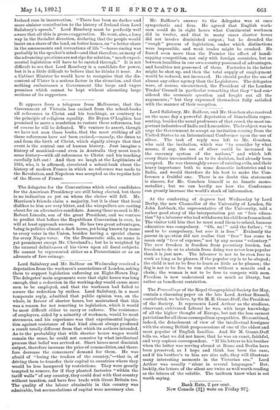Lord Salisbury and Mr. Balfour on Wednesday received a deputation
from the workmen's associations of London, asking them to support legislation enforcing an Eight-Hours Day. The delegates' main arguments were that eight hours was long enough, that a reduction in the working-day would cause more men to be employed, and that the workmen had failed to secure the reduction by strikes. Lord Salisbury, in a most temperate reply, admitted that public opinion was, on the whole, in favour of shorter hours, but maintained that this was a reason for not resorting to legislation, which it would be most difficult either to carry or enforce. The resistance of employers, aided by a minority of workmen, would be most strenuous, and his experience was that experimental legisla- tion against resistance of that kind almost always produced a result totally different from that which its authors intended. As to the probability that with shorter hours wages would remain the same, he could not conceive by what intellectual process that belief was arrived at. Short hours must diminish output, therefore increase the price of commodities, and there- fore decrease the consumers' demand for them. He was afraid of "losing the traders of the country,"—that is, of driving them to transfer their capital to countries where they would be less hampered by restrictions. They were greatly tempted to remove, for if they planted factories "within the tariff walls" of any country, they could deal with that country without taxation, and have free trade with Great Britain too. The quality of the labour obtainable in this country was admirable, but accumulations of capital were necessary also.






































 Previous page
Previous page